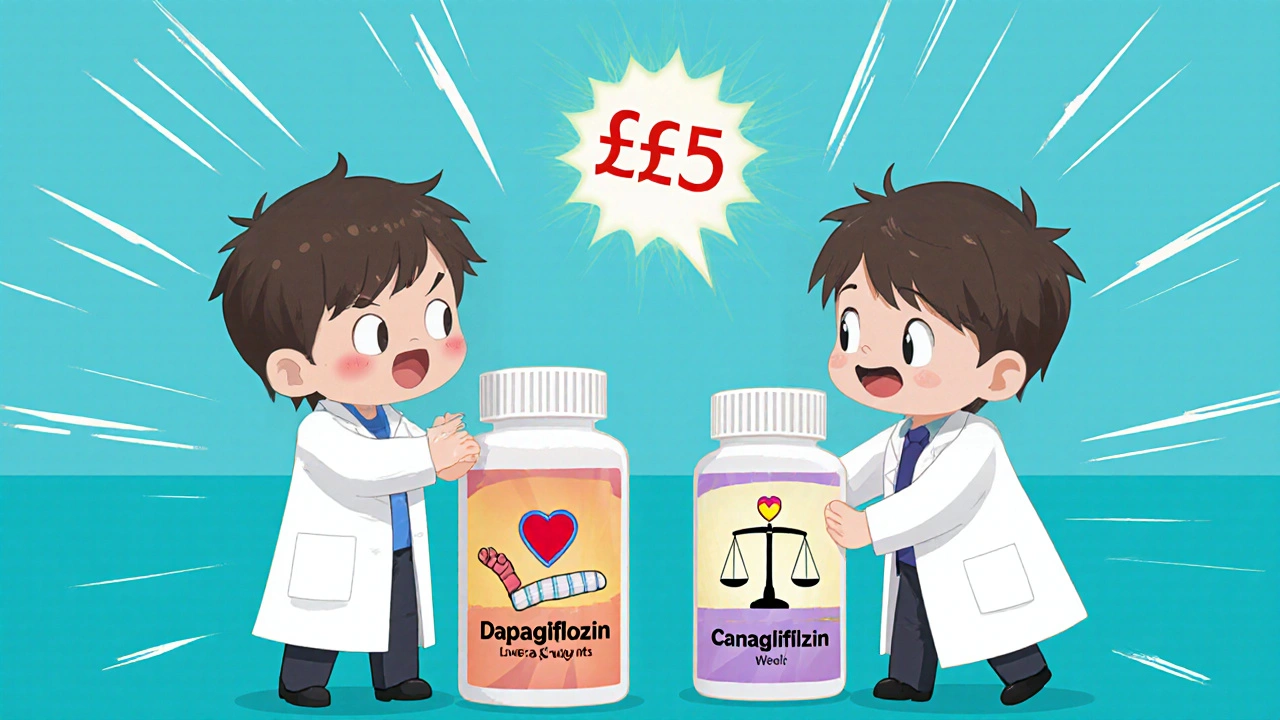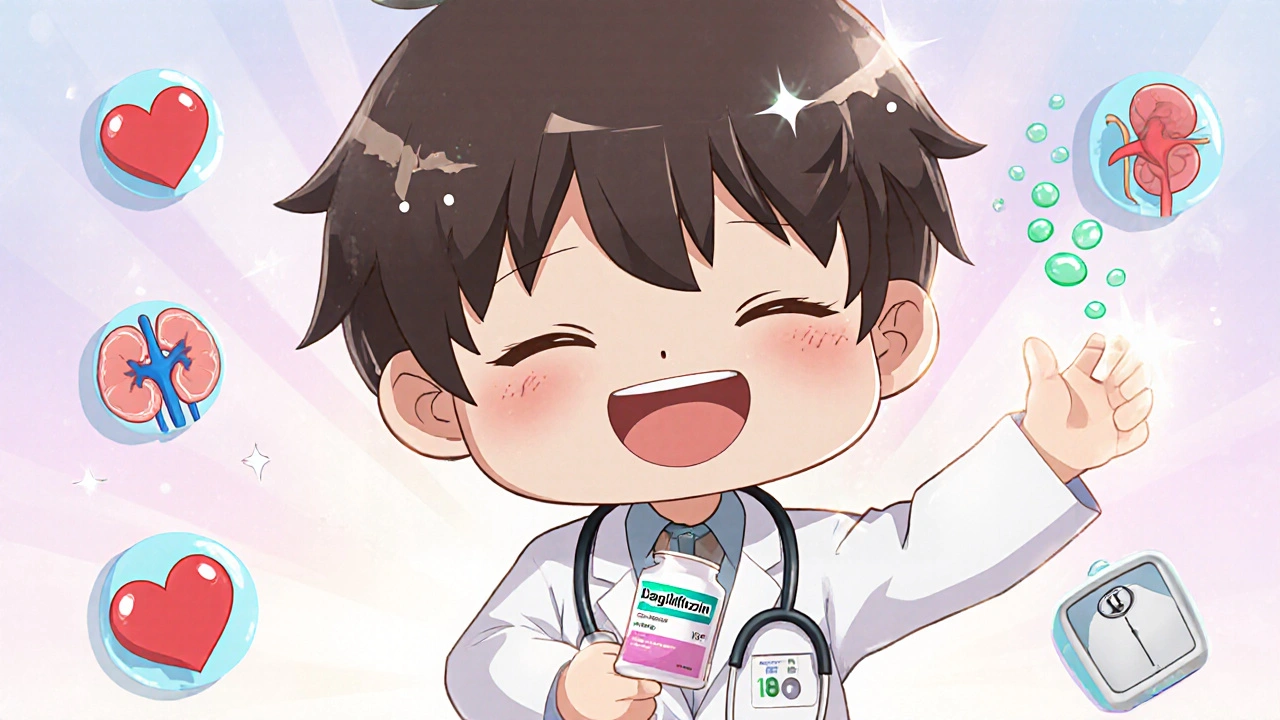Diabetes Medication Comparison Tool
How This Tool Works
Select up to 4 medications to compare their key attributes. The tool will show side-by-side differences in effectiveness, cost, side effects, and heart/kidney protection.
Comparison Results
| Attribute | ||||
|---|---|---|---|---|
| HbA1c Reduction | ||||
| Weight Impact | ||||
| Heart Protection | ||||
| Kidney Protection | ||||
| Common Side Effects | ||||
| Monthly Cost (UK) | ||||
| Administration |
If you're taking Dapasmart (dapagliflozin) for type 2 diabetes, you might be wondering if there’s a better option-or at least another one that works just as well. You’re not alone. Many people on this medication ask: Dapagliflozin helps lower blood sugar, but how does it stack up against other pills like empagliflozin, canagliflozin, or even metformin? Let’s cut through the noise and look at what actually matters: effectiveness, side effects, cost, and real-life impact.
What Dapasmart (Dapagliflozin) Actually Does
Dapagliflozin is an SGLT2 inhibitor. That’s a fancy way of saying it makes your kidneys flush out extra sugar through urine. It doesn’t rely on insulin, which is why it works even when your body’s insulin resistance is high. People who take it typically lose 2-4 kg in the first few months-not because they’re dieting, but because they’re peeing out 60-90 grams of glucose a day. That’s roughly 240-360 calories gone, just like that.
It also lowers blood pressure slightly, reduces heart failure risk, and protects kidney function. These aren’t side effects-they’re benefits built into how the drug works. The FDA approved it in 2014, and since then, over 10 million prescriptions have been filled in the U.S. alone. In the UK, NICE recommends it for people with type 2 diabetes who need extra help beyond metformin, especially if they have heart or kidney issues.
Dapagliflozin vs. Empagliflozin (Jardiance)
Empagliflozin, sold as Jardiance, is the closest cousin to dapagliflozin. Both are SGLT2 inhibitors. Both work the same way. Both reduce heart failure hospitalizations by about 30% in high-risk patients, according to the EMPA-REG OUTCOME and DECLARE-TIMI 58 trials.
So what’s the difference?
- Dose: Dapagliflozin comes in 5 mg and 10 mg tablets. Empagliflozin comes in 10 mg and 25 mg. You don’t need to take more of empagliflozin to get the same effect-it’s just a different dosing scale.
- Heart failure outcomes: Empagliflozin has slightly stronger data in patients with established heart failure. Dapagliflozin’s data is strong too, but more focused on preventing heart failure in people at risk.
- Cost: In the UK, both are available as generics. Dapagliflozin tends to be £5-£10 cheaper per month at the pharmacy counter.
For most people, switching between these two makes little difference. If your doctor prescribed dapagliflozin and you’re doing well, there’s no urgent reason to switch. But if you’re on empagliflozin and having side effects, dapagliflozin is a solid swap.
Dapagliflozin vs. Canagliflozin (Invokana)
Canagliflozin is another SGLT2 inhibitor, but it’s got a rougher reputation. It’s more likely to cause genital yeast infections and urinary tract infections. It also carries a higher risk of foot and leg amputations-something the FDA added to its black box warning in 2017. That’s not a small thing.
Canagliflozin also has a stronger effect on lowering blood pressure, which can be good or bad depending on your situation. If you’re already on blood pressure meds and your numbers are low, canagliflozin might drop them too far.
Studies show canagliflozin reduces HbA1c by about 0.8-1.1%, while dapagliflozin brings it down by 0.7-1.0%. So the sugar-lowering power is nearly identical. But the safety profile? Dapagliflozin wins by a mile.
If your doctor suggests canagliflozin, ask why. For most people, dapagliflozin is the safer pick.

Dapagliflozin vs. Metformin
Metformin is still the first-line drug for type 2 diabetes. It’s cheap, safe, and has been used for over 60 years. It doesn’t cause weight gain, and it doesn’t cause low blood sugar unless you’re taking it with insulin or sulfonylureas.
But here’s the catch: metformin doesn’t protect your heart or kidneys like dapagliflozin does. If you have heart disease, chronic kidney disease, or a history of heart failure, metformin alone isn’t enough. That’s why guidelines now say: start with metformin, then add dapagliflozin if you need more control-or if you have cardiovascular or kidney risks.
Side effects? Metformin causes bloating, diarrhea, and nausea in up to 30% of users, especially at first. Dapagliflozin causes more frequent urination and a higher chance of yeast infections. Neither causes low blood sugar on its own.
Many patients end up on both. It’s not either/or-it’s often both. The combination of metformin and dapagliflozin is one of the most prescribed in the UK for type 2 diabetes.
Dapagliflozin vs. GLP-1 Receptor Agonists (like Semaglutide)
GLP-1 drugs like semaglutide (Ozempic, Wegovy) are hotter right now. They cause more weight loss-up to 15% of body weight-and have even stronger heart benefits. But they’re injectables. And expensive. A monthly supply of semaglutide can cost £100-£150 without NHS coverage.
Dapagliflozin? One pill a day. Around £15-£25 a month in the UK, even without a prescription. It’s much easier to stick with.
Studies show semaglutide lowers HbA1c by 1.5-2%, while dapagliflozin lowers it by 0.7-1%. So semaglutide wins on sugar control. But dapagliflozin wins on simplicity, cost, and ease of use.
If you’re overweight, want serious weight loss, and don’t mind injections, semaglutide is powerful. If you want something simple, affordable, and proven to protect your heart and kidneys? Dapagliflozin still holds its ground.
What About Other Options? Sulfonylureas, DPP-4 Inhibitors, Insulin
Sulfonylureas like gliclazide lower blood sugar but cause weight gain and low blood sugar. That’s why they’re falling out of favor. DPP-4 inhibitors like sitagliptin are weight-neutral and safe, but they’re weak-only lowering HbA1c by 0.5-0.8%. Insulin works, but it’s complicated, causes weight gain, and requires constant monitoring.
Dapagliflozin sits in a sweet spot: it’s effective without the downsides of older drugs. It doesn’t make you gain weight. It doesn’t make you crash with low blood sugar. And it protects organs you can’t afford to lose.
Who Should Avoid Dapagliflozin?
It’s not for everyone.
- If you have severe kidney disease (eGFR below 25), it won’t work-your kidneys can’t flush sugar anymore.
- If you’re prone to urinary tract infections or have recurrent yeast infections, you might get more of them.
- If you’re dehydrated, on diuretics, or have low blood pressure, you could feel dizzy or faint.
- It’s not approved for type 1 diabetes. Don’t use it unless your doctor specifically prescribes it for type 2.
Also, if you’re planning surgery, your doctor might ask you to stop it a few days before. It can increase the risk of ketoacidosis during fasting or illness-even if your blood sugar looks normal.
Real-Life Experience: What Patients Say
One woman in Manchester, 58, switched from metformin to dapagliflozin after her HbA1c stayed at 8.2%. Within three months, it dropped to 6.9%. She lost 5 kg. Her blood pressure went from 142/88 to 128/80. She didn’t feel different-no energy boost, no magic. But her doctor said her heart and kidneys were now under less stress.
A man in Leeds stopped dapagliflozin after getting two yeast infections in six months. He switched to a DPP-4 inhibitor. His sugar went up a bit, but he didn’t have the itching anymore. He’s okay with that trade-off.
There’s no one-size-fits-all. But most people who stick with dapagliflozin say it’s the easiest pill they’ve ever taken.
Final Thoughts: Is Dapagliflozin the Right Choice?
If you have type 2 diabetes and:
- Need better blood sugar control beyond metformin
- Have heart disease, heart failure, or kidney disease
- Want to lose weight without extreme dieting
- Prefer a pill over an injection
- Want something affordable and widely available
Then dapagliflozin is one of the best choices you can make.
It’s not perfect. It’s not the most powerful. But it’s one of the safest, most protective, and easiest-to-live-with options on the market. Compared to other SGLT2 inhibitors, it’s got the best balance of benefit and tolerability. Compared to older drugs, it’s a clear upgrade.
Don’t switch just because something’s trendy. If you’re doing well on dapagliflozin, stay on it. If you’re struggling with side effects or cost, talk to your doctor about alternatives-but don’t assume another drug is better. Often, it’s just different.
Is Dapagliflozin better than metformin?
Metformin is still the first drug for type 2 diabetes because it’s cheap and safe. But dapagliflozin does more-it protects your heart and kidneys, helps you lose weight, and doesn’t cause low blood sugar. If you have heart or kidney disease, dapagliflozin is often added to metformin, not used instead of it.
Can I switch from empagliflozin to dapagliflozin?
Yes. Both are SGLT2 inhibitors and work almost identically. Switching is common if you’re having side effects or want to save money. Dapagliflozin is often cheaper and has slightly better data for preventing heart failure in people without existing heart disease.
Does dapagliflozin cause weight loss?
Yes. Most people lose 2-4 kg in the first 3-6 months. It’s not because you’re eating less-it’s because your body is excreting sugar through urine, which burns extra calories. The weight loss slows after the first few months, but many keep the reduction long-term.
What are the biggest side effects of dapagliflozin?
The most common are increased urination, genital yeast infections (especially in women), and mild dehydration. Drinking enough water helps. If you get frequent infections or feel dizzy when standing, talk to your doctor. Serious side effects like ketoacidosis are rare but possible.
Is dapagliflozin covered by the NHS?
Yes. Dapagliflozin is available as a generic on the NHS for people with type 2 diabetes who meet clinical criteria-usually if they need additional glucose control after metformin, or if they have heart or kidney disease. You’ll pay the standard prescription charge unless you’re exempt.
Can I take dapagliflozin if I have kidney problems?
It depends. Dapagliflozin works best when your kidneys are still functioning. If your eGFR is below 25, it’s not recommended. But for mild to moderate kidney disease (eGFR 30-59), it can actually slow progression. Always get your kidney function checked before starting.







Rahul hossain
November 2, 2025 AT 00:48Dapagliflozin is not a miracle drug-it’s a tool. And like any tool, its value depends on the craftsman. In India, where access to healthcare is uneven and dietary habits are shifting rapidly, this medication offers a rare combination: efficacy without dependency. But let’s not romanticize it. The real win isn’t the sugar in the urine-it’s the fact that it forces us to rethink diabetes as a systemic disease, not just a glucose problem. Still, I’ve seen patients stop drinking water because they ‘don’t want to pee so much.’ That’s not compliance. That’s ignorance dressed as self-control.
Reginald Maarten
November 3, 2025 AT 02:29Actually, the claim that dapagliflozin ‘doesn’t rely on insulin’ is misleading. All SGLT2 inhibitors function independently of insulin secretion, yes-but they still require functional beta-cell activity to maintain glucose homeostasis in the long term. Furthermore, the ‘240–360 calories gone’ assertion is statistically inaccurate: glucose excretion yields approximately 4 kcal per gram, so 60–90 grams equals 240–360 kcal, not ‘calories gone’ as if energy magically vanished. Precision matters. Also, the FDA approval date is correct, but the 10 million U.S. prescriptions figure conflates total prescriptions with unique patients-highly misleading.
Jonathan Debo
November 4, 2025 AT 12:22Let’s be perfectly clear: the notion that dapagliflozin is ‘safer’ than canagliflozin is a gross oversimplification. The amputation risk with canagliflozin is real-but it’s confined to patients with pre-existing peripheral arterial disease, diabetic neuropathy, or foot ulcers. To blanketly condemn it is irresponsible. Also, the ‘£5–£10 cheaper’ claim? That’s based on UK pharmacy pricing, but in the U.S., without insurance, dapagliflozin can cost upwards of $400/month-while generic empagliflozin hovers around $30. Cost comparisons must be geographically contextualized-or they’re just propaganda.
Robin Annison
November 6, 2025 AT 10:10I’ve been thinking about this a lot lately-not just as a patient, but as someone who’s watched a loved one navigate diabetes for over a decade. There’s something deeply human in how we reduce complex biology to pill comparisons. Dapagliflozin doesn’t just lower glucose-it changes the rhythm of daily life. More bathroom breaks. More water bottles. More awareness. It’s not just medicine; it’s a lifestyle recalibration. And maybe that’s why people stick with it: not because it’s the most powerful, but because it asks less of them than insulin, less than injections, less than constant fear. It lets you live, even while managing a chronic disease.
Abigail Jubb
November 6, 2025 AT 11:01Okay, but have we considered the emotional toll? I mean-imagine waking up every day knowing your body is literally peeing out your energy. It’s not just a drug-it’s a betrayal. Your own kidneys are working against you. And then you’re told to drink more water? Like that’s the solution? I’ve seen friends cry because they feel like their bodies are leaking them away. This isn’t just pharmacology-it’s existential. And nobody talks about that. We just list side effects like they’re grocery items.
George Clark-Roden
November 6, 2025 AT 12:55I want to say something gentle here. I’ve been on dapagliflozin for two years. I lost 7 pounds. My A1C dropped from 8.1 to 6.4. I didn’t feel like a hero. I didn’t feel like anything, honestly. But last month, my cardiologist said, ‘Your heart’s doing better than it has in five years.’ And I cried-not because I was happy, but because I realized I’d been waiting for permission to feel okay. This drug didn’t fix me. It didn’t make me ‘cured.’ But it gave me space-to breathe, to walk, to forget, for a little while, that I have a disease. That’s worth more than any HbA1c number.
Hope NewYork
November 8, 2025 AT 02:47so like… is this just a fancy diuretic? bc honestly i think big pharma just repackaged peeing as a feature. like… why is this even a thing? my cousin took it and got a yeast infection so bad she had to quit. and now she’s on insulin and says she feels better. also… why are we all so obsessed with pills? what if we just… ate less sugar? just a thought lol
Bonnie Sanders Bartlett
November 8, 2025 AT 14:07If you're new to this, don't panic. Dapagliflozin isn't a magic bullet, but it's not the enemy either. It's one piece of a bigger puzzle. Talk to your doctor, yes-but also talk to other people who are on it. Join a support group. Drink your water. Keep your feet dry. Track how you feel, not just your numbers. You're not alone in this. Many of us have been where you are. And we’re still here. That counts.
Melissa Delong
November 9, 2025 AT 20:10Let me ask you this: who benefits from promoting dapagliflozin as ‘protective’? The patients? Or the shareholders of AstraZeneca? The FDA approved it based on surrogate endpoints-reduced hospitalizations, not mortality. And yet, we treat it like a miracle. Meanwhile, the real root causes of type 2 diabetes-processed food, poverty, lack of access to fresh produce-are ignored. This isn’t medicine. It’s corporate damage control dressed in clinical trials.
Ted Carr
November 10, 2025 AT 15:03So… we’re giving people a drug that makes them pee out calories… and calling it ‘innovative’? Next they’ll invent a pill that makes you sneeze out fat. At this point, diabetes management feels like a game of whack-a-mole with your own biology. I’ll take a good diet and a walk any day. But hey-free prescription, right? Let’s keep the machine running.
Rebecca Parkos
November 10, 2025 AT 17:27I was on metformin for five years and had constant bloating and panic attacks from the GI side effects. Switched to dapagliflozin-zero bloating, lost 10 pounds, and my energy came back. Yes, I get yeast infections-but I treat them. It’s a trade-off. And honestly? I’d rather deal with a yeast infection than feel like I’m swallowing glass every morning. This isn’t about being perfect. It’s about surviving.
Bradley Mulliner
November 11, 2025 AT 05:40Let’s be brutally honest: most people on dapagliflozin are not ‘protecting their kidneys’-they’re just delaying the inevitable. The real tragedy isn’t the drug’s side effects-it’s that we’ve turned a chronic, lifestyle-driven disease into a pharmaceutical dependency cycle. You take a pill to fix the symptom, then another pill to fix the side effect, then another to fix the pill’s side effect. And we call it progress. It’s not. It’s escalation.
Marshall Washick
November 11, 2025 AT 12:43There’s a quiet dignity in taking a pill that doesn’t ask you to change everything. You don’t need to become a monk, or give up bread, or run marathons. You just drink water, take the pill, and go about your day. And somehow, over time, your body listens. It’s not glamorous. It’s not viral. But for the quiet majority-people who just want to wake up without fear-that’s enough. I’ve seen it. I’ve lived it. And I won’t apologize for it.